Finance organizations absolutely need a customer relationship management (CRM) solution. But there’s more than one type of finance institution, including banks, insurance companies, investment firms, mortgage brokers, financial advisors, and wealth managers, all with different needs, workflows, and customer demands.
So the key to success is finding the right software for your unique business and market needs.
In this guide, we’ll walk you through the top five finance CRMs, plus the basics behind choosing the right finance CRM software, the key features to consider, and why monday CRM is ideal for financial services.
Try monday CRMWhat is a finance CRM?
A finance CRM is specialized software for the financial services industry that helps manage customer interactions, streamline operations, ensure compliance, and deliver personalized products and services. Equally important, the best finance CRMs can be customized to fit the needs of different finance organizations so they can deliver personalized finance products for their customers.
Finance CRMs also promote cross-team collaboration — as sales, marketing, and customer service teams all have access to the same customer data,
For example, if a customer service representative at the bank helped an individual frustrated with transfer restrictions between accounts, a salesperson could reach out to that customer to upsell an account with fewer restrictions.
Related article: What is CRM?
Benefits of using a finance CRM
Here are some of the key benefits of using a finance CRM system.
Personalized services
A finance CRM enables financial advisors to tailor solutions for each customer based on their unique needs, goals, and financial history. This helps build stronger relationships and increase customer satisfaction.
Increased productivity and efficiency
A finance CRM centralizes customer data and automates repetitive tasks, reducing manual data entry and enabling faster, more reliable processes. This frees up time for employees to focus on providing exceptional service.
Improved collaboration and communication
With all customer information accessible on a single platform, a finance CRM enables cross-department teams like sales, marketing, and customer service to collaborate and communicate effectively. This ensures a consistent, high-quality experience for clients.
Actionable insights
Finance CRMs provide valuable business intelligence and analytics on customer behavior, preferences, and trends. This data-driven approach helps financial firms make smarter decisions and identify growth opportunities.
Regulatory compliance
Many finance CRM solutions offer tools to help financial services companies adhere to industry regulations around data privacy, security, and record-keeping and mitigate legal and reputational risks.
By leveraging these capabilities, finance CRMs enable financial institutions to deliver personalized services, increase productivity, maintain compliance, and drive business growth through better customer experiences and data-driven decision-making.
How to choose a finance CRM
Here are some key considerations when choosing a finance CRM.
Customization and flexibility
Look for a customizable finance CRM that you can tailor to your specific workflows, processes, and data requirements. It should be flexible enough to adapt as your business needs evolve.
User adoption and ease of use
Choose a finance CRM with an intuitive user interface that’s easy for your team to learn and use on a daily basis. High user adoption is critical for getting the most value from the system.
Data security and compliance
In the finance industry, protecting sensitive customer information is paramount. Ensure the finance CRM has robust security measures and can meet complex regulatory standards around data privacy.
Collaboration and communication
The best finance CRMs facilitate teamwork across departments like sales, marketing, customer service, and compliance. Look for features that enable seamless communication and information sharing.
Analytics and reporting
The finance CRM should provide visibility into key metrics like sales pipeline, customer behavior, and marketing ROI. So, look for a robust analytics dashboard that generates real-time insights and informs business decisions.
Integration and scalability
Choose a finance CRM that can integrate with your existing systems and apps to create a unified view of customer data. It should also be scalable to support your growth as your business expands.
Vendor reputation and support
Consider the finance CRM provider’s track record, industry expertise, and commitment to customer success. Evaluate the quality of their training, documentation, and ongoing support.
By carefully evaluating these factors, you can select a finance CRM that delivers a strong ROI by improving customer relationships, streamlining operations, and driving business growth.
The top 5 CRMs for financial services
There are several options when choosing a finance CRM platform, each with its pros and cons. In this next section, we’ll walk you through the top five CRMs for financial services.
1. monday CRM
Best for: The entire customer journey
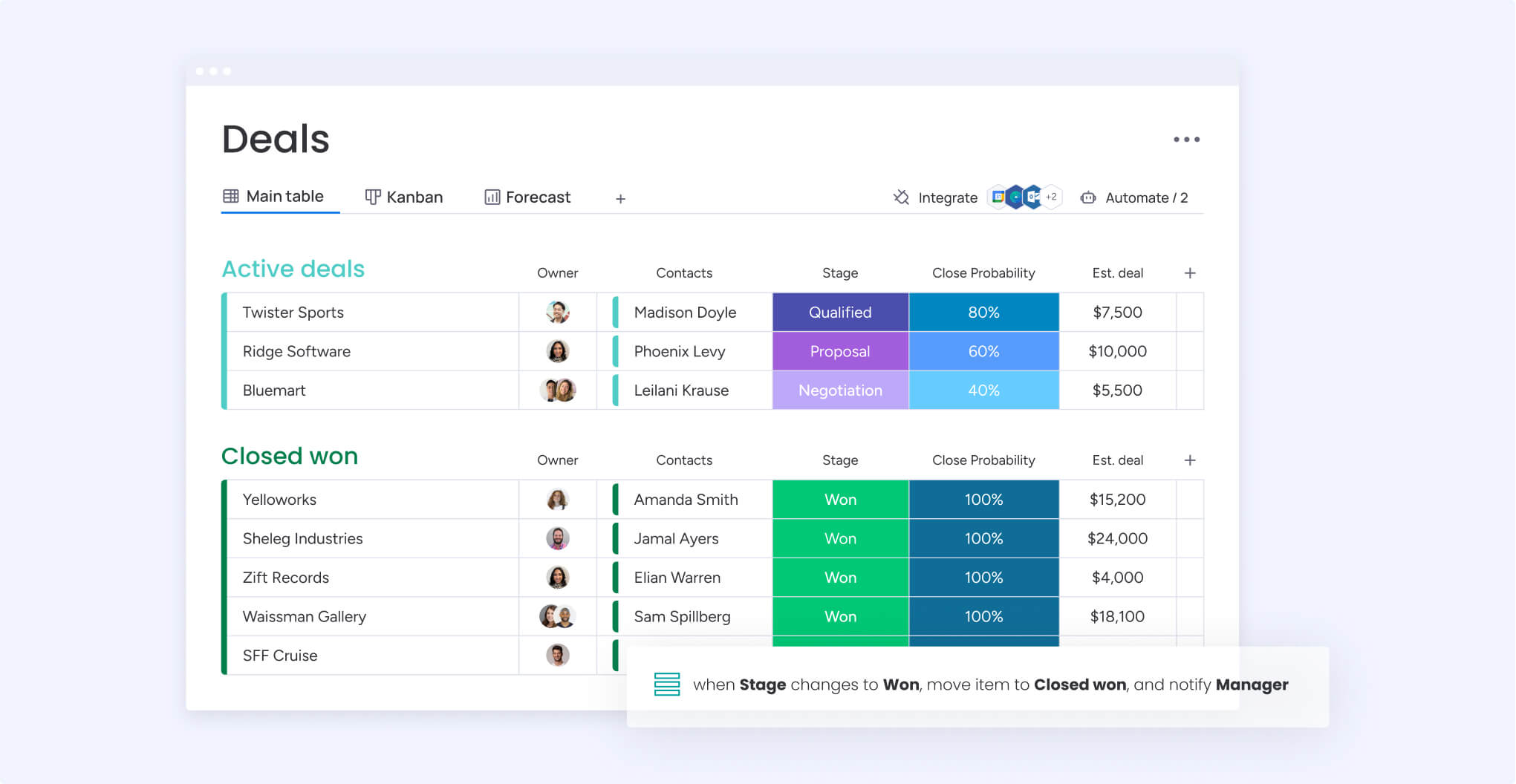
monday CRM is a fully-customizable, no-code platform that lets you centralize your entire sales cycle. You can organize and manage your pipeline, streamline customer communications, automate manual processes, and gain valuable insights into all your data in one place.
Key features of monday CRM
- Automation: Save valuable time and close more deals by automatically assigning leads to agents, setting reminders for upcoming activities, and getting notified when a lead opens an email.
- Deal management: See all your client information at a glance and get a 360-degree view of your opportunities to clearly understand where each stands in your pipeline.
- Contact management: Automatically keep track of client interactions and log sent emails in one central location. Save time with personalized email templates and AI-powered suggestions.
- Customization: Easily tailor the platform to your unique sales pipeline, workflows, and processes. Edit deal stages, add multiple columns, and manage unlimited pipelines and contacts.
monday CRM pricing: $12/user/month (Basic); $17/user/month (Standard); $28/user/month (Pro); Custom (Enterprise).
Try monday CRM2. SugarCRM
Best for: Delivering personalized customer experiences.
SugarCRM is an open-source CRM system that allows financial organizations to focus on developing deeper client relationships, maximizing client value, and delivering the best customer service.
Key features of SugarCRM
- Automation: Improve productivity by automating repetitive finance-related tasks and workflows like lead routing, quote approvals, and customer notifications.
- Reporting and analytics: Gain valuable insights on metrics like sales pipeline, customer behavior, and marketing performance.
- Compliance and security: Meet strict regulatory requirements of the finance industry with role-based access, audit trails, and data security.
SugarCRM pricing: $19/user/month (Essentials); $85/user/month (Advanced); $135/user/month (Premier).
3. Creatio
Best for: Customization
Creatio is a no-code CRM platform that enables users to automate workflows and build applications without writing a single line of code. It offers pre-built industry-specific customizations and automation for 20 industries, including banking.
Key features of Creatio
- Customization: Automate workflows and build applications using no-code tools.
- Collaboration: Align sales, marketing, and service teams on unified workflows and a single-source database.
- Lead management: Track and capture leads from different sources in a unified database.
Creatio pricing: $20/user/month (Growth); $45/user/month (Enterprise); $70/user/month (Unlimited).
4. Microsoft Dynamics 365
Best for: Integrating with other Microsoft products
Microsoft Dynamics 365 is a comprehensive enterprise software suite that combines customer relationship management (CRM) and enterprise resource planning (ERP) functionality. It helps companies streamline operations, enhance customer experiences, and drive digital transformation.
Key features of Microsoft Dynamics 365
- Integration: Connects seamlessly with other Microsoft products like Office 365, Power BI, and Azure.
- Automation: Enhance productivity, collaboration, and customer experiences with AI-generated summaries and real-time marketing.
- Customization: Select and deploy only the CRM functionalities you require.
Microsoft Dynamics 365 pricing: $50 per user/month (Customer Service Professional); $65 per user/month (Sales Professional); $95 per user/month (Customer Service Enterprise); $95 per user/month (Sales Enterprise).
5. Oracle Netsuite
Best for: Mid-size and growing businesses that want an integrated CRM and ERP solution.
Oracle Netsuite CRM is part of the broader NetSuite ERP and business management suite. It provides organizations with a unified platform to manage the entire customer lifecycle. It helps generate a single view of prospects, customers, partners, and vendors to deliver exceptional customer experiences and drive sales.
Key features of Oracle Netsuite CRM
- Customer management: Provides a centralized database to manage all customer information, including contact details, sales history, and support interactions.
- Opportunity management: Gives sales teams visibility into the sales pipeline and the status of each opportunity.
- Campaign management: Integrates marketing automation tools to help businesses create targeted campaigns, manage email marketing, and track campaign performance.
Oracle Netsuite CRM pricing: Not publicly listed, but based on an annual license fee that includes the core platform, optional modules, and the number of users.
10 key features to look for in a finance CRM
Here are ten essential features to look for in a finance CRM include:
- Customization: The ability to customize the CRM to fit finance organizations’ unique needs and workflows.
- Deal management: Tracking and managing deals and opportunities within the CRM system.
- Automation: Automating repetitive tasks and processes to increase efficiency and productivity.
- Integrations: Seamless integration with other apps and systems to create a unified view of customer data and streamline operations.
- Contact management: A searchable database of stored client contact information for easy access and management.
- Activity management: Logging all activities such as emails, calls, meetings, and more and tracking them in one cohesive timeline.
- Lead management: Tools for lead acquisition, routing, tracking, and conversion to optimize sales processes.
- Customer engagement: Features to improve customer engagement through email newsletters, social media integration, and relationship tracking.
- Marketing management: Multi-channel campaign management and personalized marketing messages to target suitable segments and maximize ROI.
- Reports and analytics: Analytics tools to create reports, evaluate performance, and predict future sales figures based on CRM data.
These key features are essential for a finance CRM to effectively manage customer relationships, streamline processes, and drive business growth within the financial services industry. That’s why we developed monday CRM to provide all of this and more…
Workspaces in monday CRM come loaded with pre-built boards for running the main components of your sales pipeline — leads, accounts, contacts, deals, activities, and sales dashboard — so it’s quick and easy to set up your CRM. Better still, these boards are already connected via automations, so your data stays in sync.
How to grow your business with monday CRM
So, how can a finance CRM help you grow your business? The following features and functionality in monday CRM enable your business to grow.
1. Centralize leads, deals, and opportunities
If you’re working for the type of financial organization that’s filling a traditional sales pipeline — like a bank or an insurance company — you want to make sure every good lead and any related key information gets passed over to your sales teams. And if you’re working for the type of financial institution that has to sift through piles of potential deals — like financial services firms or investment or private equity firms — you need to ensure that all opportunities end up in one place.
In both cases, you need a central place to store all your contacts and information related to those contacts. For instance, some financial organizations use monday CRM to automatically organize contacts on their behalf. You can easily customize your pipeline, drag and drop deals between stages, and track all contact interactions.
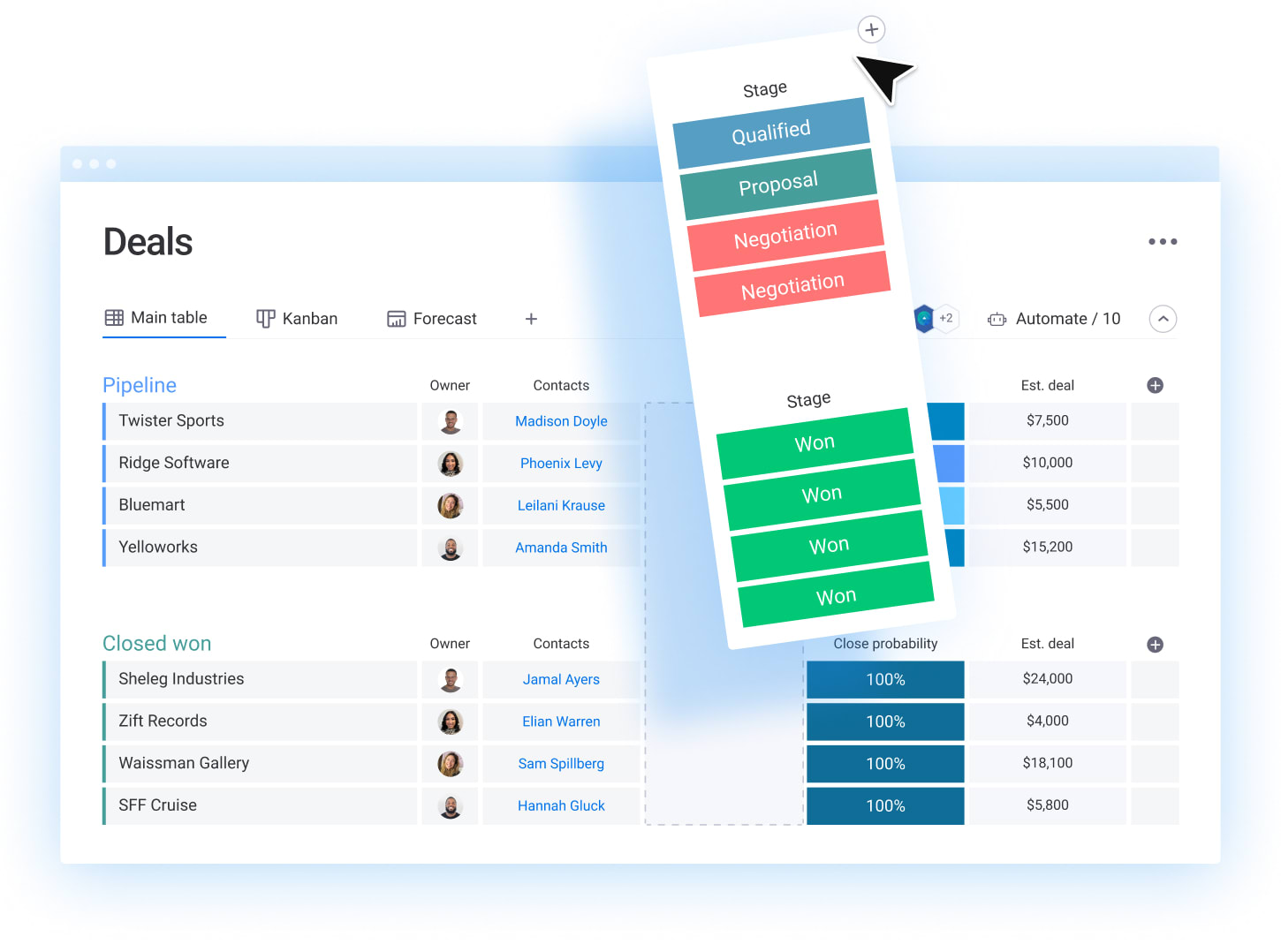
2. Use automation to improve processes
If you use a finance CRM that supports automations, like monday CRM, you can automatically send leads straight into your CRM system when a prospect fills out a form on your website. As mentioned previously, with monday CRM, you can also automatically record new information or contacts using a direct integration with Gmail or Outlook.
This type of integration is popular with investment firms, private equity firms, and venture capitalists that receive many incoming deal opportunities through their consultants’ inboxes. In this case, we suggest creating a dedicated email alias where everyone forwards new opportunities, like [email protected].
Then, every time a deal comes in, have your team forward it to that address, and it will create a new item and contact in your finance CRM. The integration also supports files, so no information gets lost when creating a new contact. No matter how you import your contacts, the result is an organized list of items you can customize to your needs.
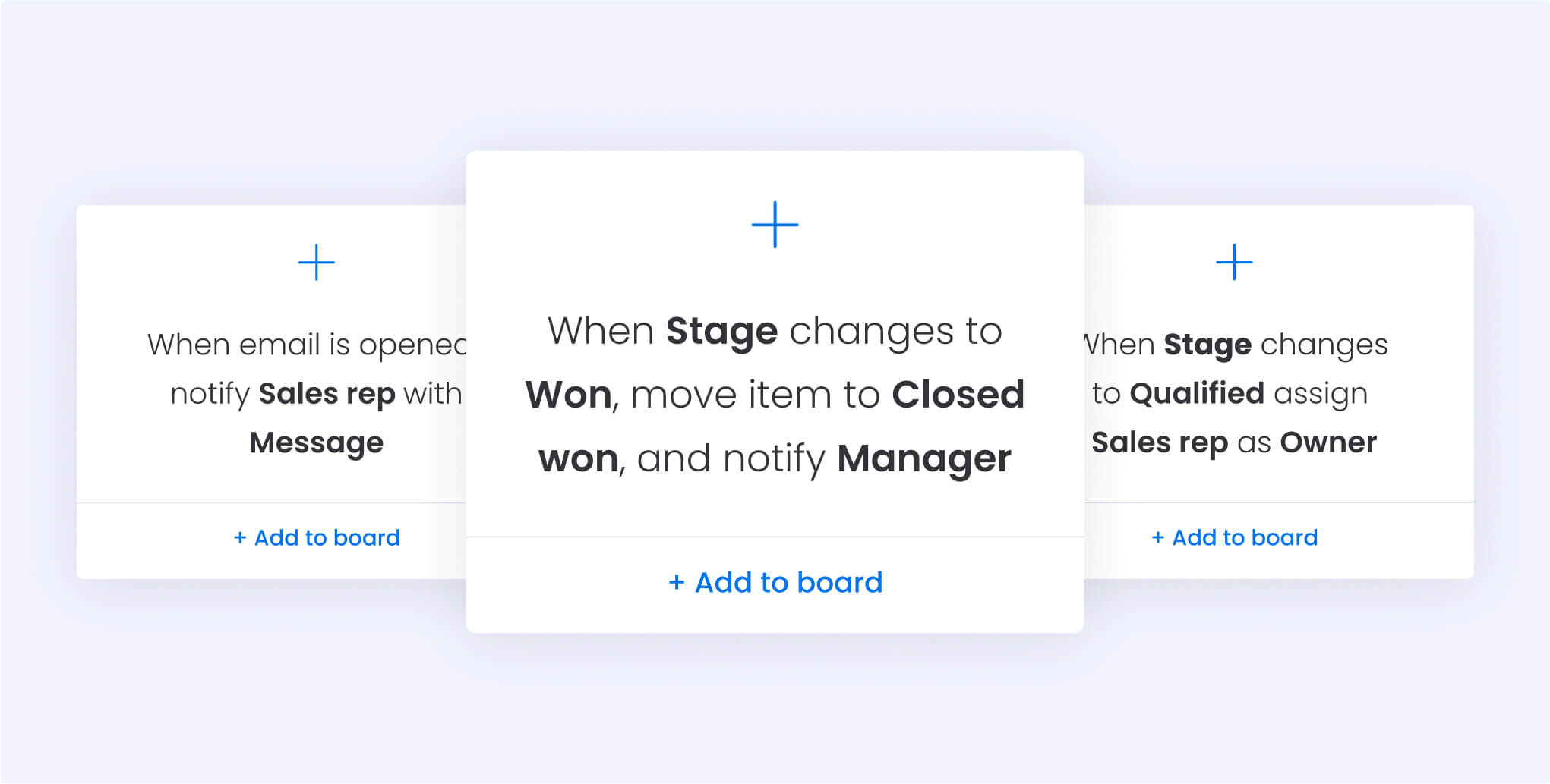
3. Improve team collaboration
The trick to ensuring that no lead or deal opportunity slips through the cracks is to assign each individual contact a designated owner responsible for managing that relationship.
Hunter Walk, a well-known seed round investor, famously said, “You lose 100% of the deals you don’t see.” We think the same sentiment also holds true for leads. Once you’ve collected and organized all of your contact information, your finance CRM should allow you to assign specific team members to each contact so you can see all your deals and follow up with all qualified leads.
The good news is that monday CRM clearly organizes items by assigned team members. And, you can even assign multiple people to an item if a contact requires more than one owner. You can also gain insights into where deals stand, expected revenue, your team’s performance, and more.
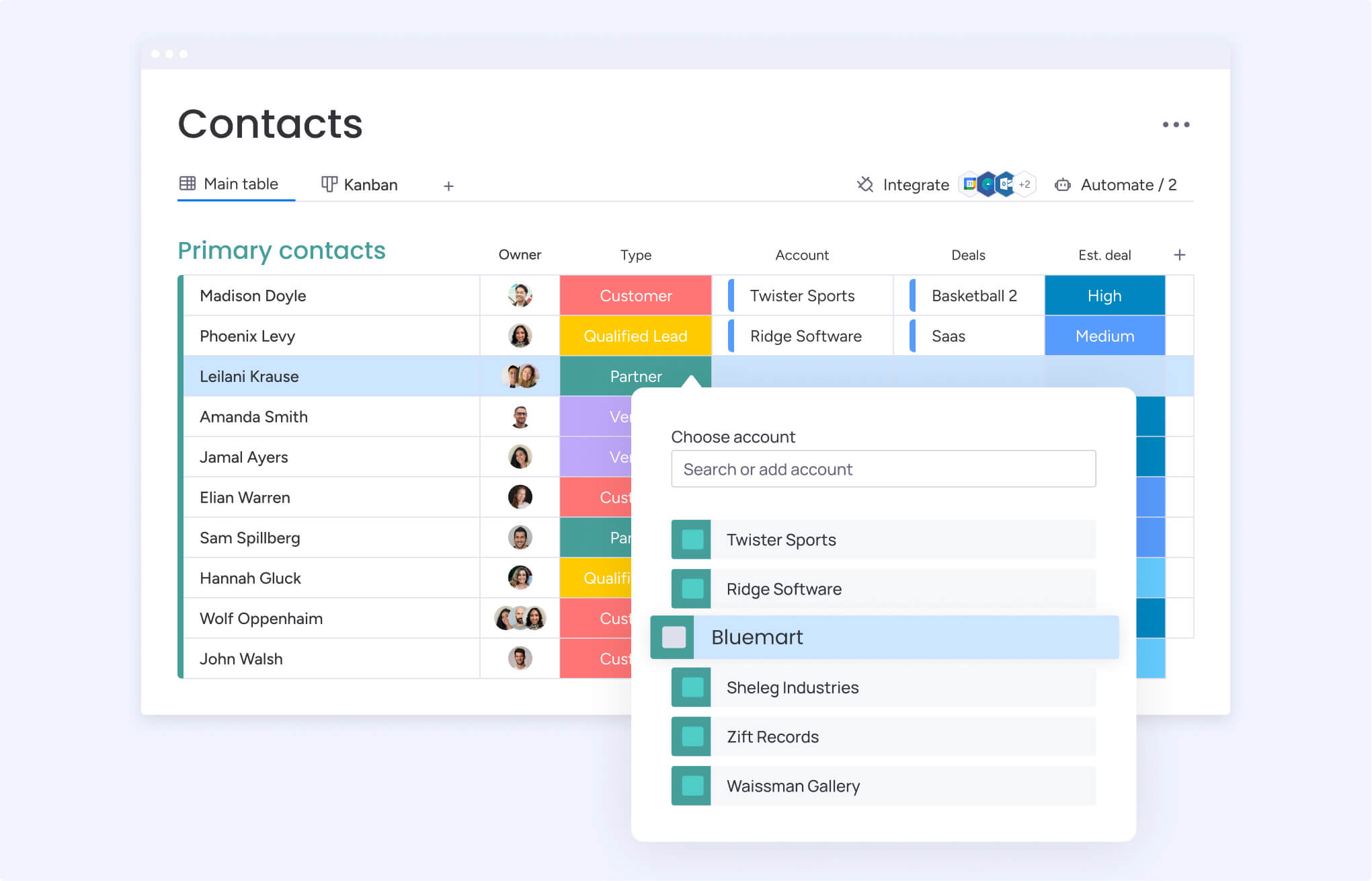
4. Keep contact data up-to-date
As you work with contacts, you’ll need to record and update information, such as communication records, internal conversations, or file attachments related to each lead or opportunity. For financial institutions, this might include business plans, pitch decks, financial reports, transfer requests, and other customer interactions.
With monday CRM, you can talk with team members directly on the platform, plus upload files, add notes, and update information on the go with the mobile app. This ensures all contact data is always kept up-to-date and provides a single source of truth for all customer information. Plus, with a 360-degree view of your customers, you can record your contact and account information in one place.
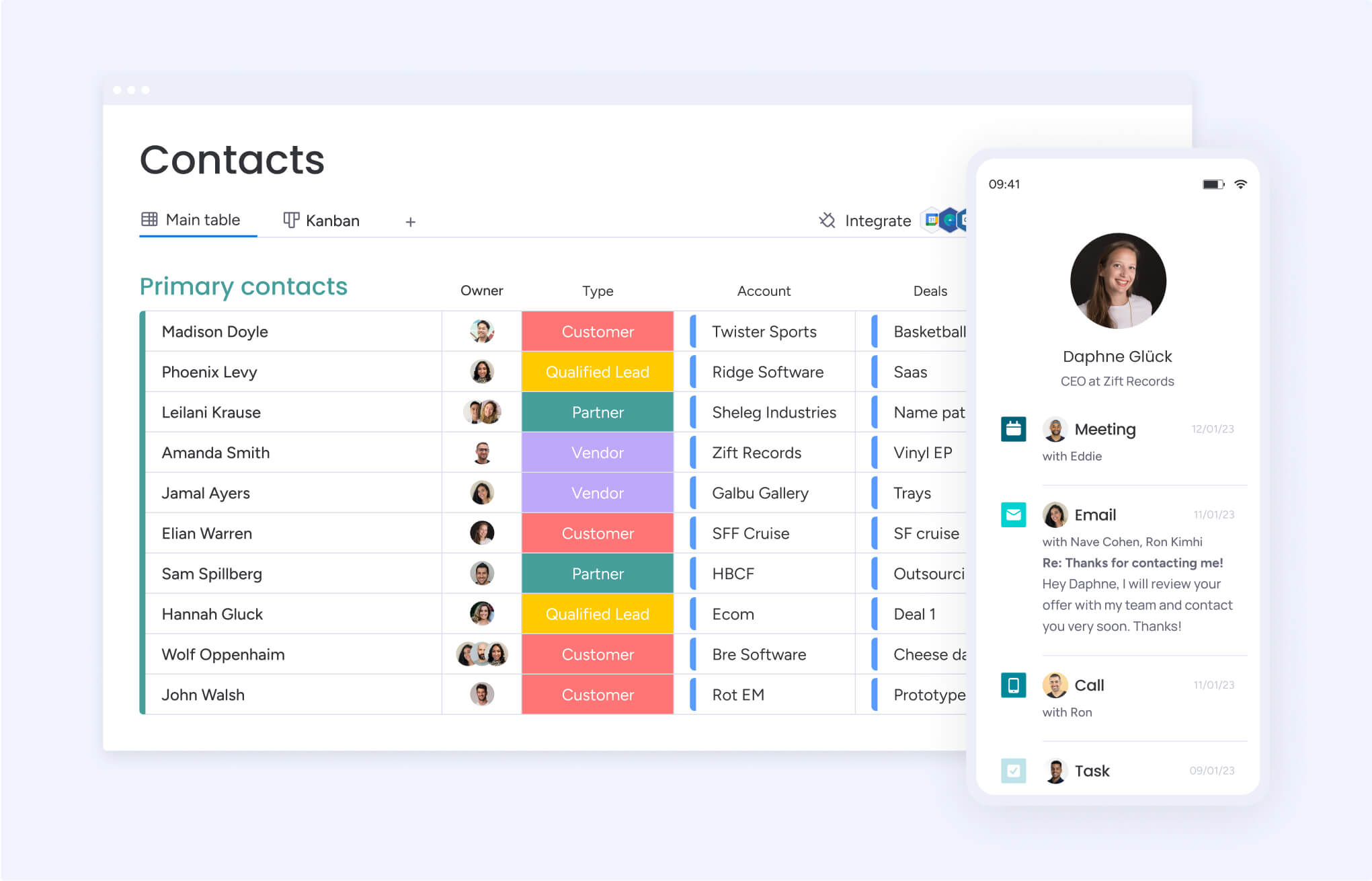
If you like what you see, why not take your workflows up a notch with CRM features perfect for financial services firms? You can start a free trial now, or if you still have unanswered questions, take a look at the most frequently asked questions below.
Try monday CRMFAQs
Why do financial advisors need a CRM?
Building trust is a key factor for financial advisors, and one way to achieve this is through improving customer management. The right finance CRM system will help financial advisors streamline processes, improve customer communications, personalize customer journeys, and create financial plans. For example, you can understand where all client portfolios stand at a glance and create custom dashboards, timelines, and other important information.
How does a finance CRM improve customer experience?
By providing a 360-degree view of customer information, finance CRMs enable personalized interactions, timely responses, and tailored financial solutions, which all help to increase customer satisfaction and trust.
Which departments can benefit from a finance CRM?
Various departments, such as marketing, sales, customer service, loan origination, compliance, HR, and IT, can leverage a finance CRM to collaborate, streamline processes, and enhance customer interactions.
What does CRM mean in banking?
In banking, CRM refers to the systems and processes that banks use to manage their interactions with current and potential customers. It helps banks understand customer needs, improve customer service, personalize offerings, and enhance customer satisfaction and loyalty.
What is CRM in Fintech?
CRM in fintech involves using digital tools and platforms to manage customer relationships in the financial technology sector. It focuses on leveraging technology to provide personalized customer experiences, streamline operations, and enhance customer engagement through data-driven insights and automation.
Can AI be used in finance CRM?
Yes, AI can be used in finance CRM to enhance customer insights, automate routine tasks, and provide personalized customer experiences. AI technologies can analyze large volumes of data to predict customer behavior, offer tailored recommendations, and improve decision-making processes, ultimately boosting efficiency and customer satisfaction.

